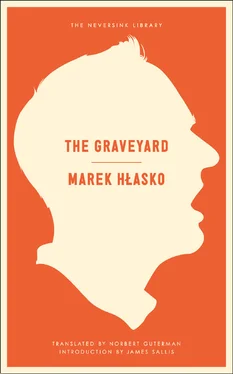“He’s drunk,” a boy cried. “A big man like that! Blubbering like a baby!”
The sidewalks were filled with people; the factory sirens were howling, and the sounds vanished somewhere under the cardboard sky. A crowded noisy tramcar clattered by. The neon sign over the city went out.
HE WAS WIFELESS; HIS WIFE HAD DIED A FEW weeks after the end of hostilities; though of poor health, she had managed to stay alive until his return from the woods. He lived with his son and daughter. His son’s name was Mikołaj, his daughter’s Elzbieta. Mikołaj, a magnificently handsome boy, was twenty-four; Elzbieta was younger. They occupied two small rooms in a new housing project. The day after the meeting, when Franciszek came home, he found his daughter with her fiancé, Roman. They attended the same courses, and planned to marry immediately after getting their degrees. Both looked happy.
“Got something for supper?” Franciszek asked. He stood in the middle of the room without removing his overcoat and hat.
“I’ll warm up something for you,” Elzbieta said. She rose. She was tall, towheaded, attractive. Franciszek’s heart sometimes tightened when he looked at her: he had the feeling that he was seeing the woman with whom he had lived his happiest moments twenty years earlier. No one could have discovered any difference between Elzbieta and her mother; both were the image of health, though both spent their time complaining. “I’ll warm the macaroni for you,” Elzbieta said. “I can make you an omelet too.” She went to the kitchen. Franciszek sat down stiffly on a chair.
“Well, Pop,” said Roman, a black-haired, swarthy boy with fiery eyes, “what’s the matter? Troubles?” Roman called Franciszek “little father-in-law,” “old man,” or “Pop.” The dry and forbidding Franciszek forgave him much for the sake of his daughter’s love-drenched eyes.
“Everybody has troubles,” he said, and broke off, crushed by the stupidity of his own words.
“Clever observation,” Roman said. “Elzbieta and I got drunk today.”
Franciszek started. “Really?”
“Really. We drank a bottle of wine after passing our exams. Ha-ha-ha.”
Franciszek sighed with relief. “Thank God.”
“What?”
“Thank God.”
“A metaphysical notion. You surely know, Pop, that religion is opium for the masses. You know that, don’t you?”
“Yes.”
“And who said it?”
“I’m tired,” Franciszek said gently. “Let me alone, Romek.”
“You just don’t remember. That’s bad, bad. Once your memory begins to fail, you can make all sorts of blunders. Lenin wrote brilliantly about memory. It’s in a letter to a friend, saying he needed money for an abortion.”
Franciszek opened his eyes wide. “Roman, what are you talking about? Where did he write that?”
Roman expressed surprise. “Don’t you remember?”
“No.”
“Come, come.”
“Really, I don’t.”
Roman wrung his hands. “Why, that’s impossible.”
“My word of honor.”
Roman laughed triumphantly. “Of course it’s not true,” he said. “I just wanted to see whether you’d be taken in by such rot.”
He went on talking, very fast and loud, emphatically and stiffly — he was active in student party affairs, and when he spoke to one man it was as if addressing millions. The shadows cast by his vigorous gestures ran back and forth across the ceiling. Franciszek did not hear him; he looked at him with half-closed eyes, and although Elzbieta was not in the room, he saw her pure and austere face beside Roman’s. “So that’s how it is,” he thought. “This little black beetle, and you — so clear and pure. Your calm and his arrogance; he solves all your problems for you in a minute, problems you’d struggle with for weeks on end. He’ll explain everything to you, and everything will come out even as in a multiplication table. He is your fool and your sorcerer; and you, my little one, you think you’re in love with him. What do you look like together — this barking dwarf and you?”
“Elzbieta,” he said, “I’m in a hurry.”
After a while she came in carrying a tray with a steaming dish. “You and Mikołaj think that everything makes itself,” she said. “Or that I have a dozen gnomes in the kitchen to help me.”
“A dozen, no, but one …” Franciszek began, and bit his tongue. Whenever he recalled that Elzbieta was an adult, and that there were matters of life about which she need no longer consult him, he could not bear the sight of her and Roman together.
“What’s that?”
“Nothing. It’s hot. When is Mikołaj coming?”
She glanced at the clock. “He should be here now.”
“He is always late.”
“Always.”
Franciszek knew that Mikołaj and Roman could not stand each other. Whenever he wanted to get rid of Roman, he talked about Mikołaj: the effect was instantaneous. This time it worked again. Roman began to move restlessly about the room; finally he said he had to leave and would be back tomorrow. He said a long goodbye to Elzbieta in the entrance hall, and managed to say “Bye-bye, Pop” several times. At last, to Franciszek’s great relief, the door banged shut. Elzbieta came back into the room.
“I don’t like him,” he said.
She nodded. “I know.”
“I’m sorry.”
“So am I. But I’m sure you understand.”
“I’m trying.”
She smiled weakly. “You’re wonderful.”
“Will you tell me something frankly? As frankly as you can.”
“I’ll try.”
“I want you to tell me, yes or no.”
“Yes?”
“Do you love him?”
“You know that I do.”
“Very much?”
“As much as I’m capable of.”
“You’re sure?”
Her clear eyes filled with light. He sighed.
“Yes,” she said.
He wanted to question her about their relationship, but he suddenly felt ashamed. “Why do I have to talk to her about these things?” he thought angrily. “Am I afraid, or what? It’s I who should tell her everything, not the other way around. No, damn it, I must tell her at once …” He put his fork down, and was about to tell her, but she spoke first.
“You’ve guessed everything, haven’t you?”
“I’ve guessed what?”
She peered at him closely. “You know everything,” she said.
He felt as if he had swallowed a lump of ice. He suddenly began to fear that she would tell him something that would merely sound bad; that she was too young to tell him everything clearly and well; and that she would use some unfortunate words that would torment him for years afterward. He said: “I know … he is the only human being …”
“Not the only one,” she said. “Now there is a second one …”
“Have you fallen in love with someone else?” He was about to jump from his chair when he saw her calm, almost victorious smile.
“Most of us love our own children,” she said. He looked at her, and suddenly time vanished, the years opening up like the waters in fairy tales: his own wife had used the same words, and said them in the same way to announce that she was pregnant with Mikołaj.
“You know it for sure?”
“For sure.”
“My little girl,” he whispered. “But …”
“There’s something I never told you. He’s very sick.”
“Who?”
“Roman.”
“Sick?”
“Consumption. I’m worried about him, Father. He’s very depressed; this has been going on for months. He says he’s going to die; he thinks about it all the time. He wants me to think of — him.”
“And what does he say about this?”
“Nothing.”
“How so?”
“He doesn’t know.”
Читать дальше






![Ричард Деминг - Whistle Past the Graveyard [= Give the Girl a Gun]](/books/412176/richard-deming-whistle-past-the-graveyard-give-t-thumb.webp)


